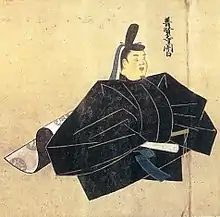
Konoe Motomichi
Konoe Motomichi (近衛 基通, 1160 – July 8, 1233) was a Kugyō (high-ranking Japanese official) from the late Heian period to the early Kamakura period.[1][2] His father was Motozane, the founder of Konoe family, and his mother was a daughter of Tadataka. Among his sons is Iezane. His wife is the sixth no Sadako.
In 1179, Motomichi was promoted to kampaku, regent, as a result of the coup led by Kiyomori, the father of his stepmother who also his father-in-law. In February of the following year he took the position of sesshō, regent-ship for Emperor Antoku.
In 1208, he ordained as a Buddhist monk and took the Dharma name Gyōri (行理).
Parents
- Father: Konoe Motozane
- Mother: Fujiwara no Tadataka
- Wife: Taira no Sadako, daughter of Taira no Kiyomori (平完子)
- Concubine: Daughter of Minamoto no Akinobu
- Konoe Iezane (近衞家実; 1179-1242), first son
- Concubine: Taira no Nobuko (平信子 )
- Konoe Michitsune (近衞道經; 1184-1238), second son
- Concubine: Daughtjer of a monk
- Takatsukasa Kanemoto (鷹司兼基), third son
- Motonori Fujiwara (藤原基教; 1196-1213), fourth son
- Unknown Concubine
- Enchu (円忠; 1180-1234)
- Enjō (円浄; 1189-1256)
- Enki (円基)
- Shizuchu (静忠; 1190-1263)
- Nisumi (仁澄)
- Minobu (実信)
- Mitoko (尊任)
References
- ↑ Miner, Earl; Morrell, Robert E.; Odagiri, Hiroko (2020-09-01). The Princeton Companion to Classical Japanese Literature. Princeton University Press. p. 464. ISBN 978-0-691-21838-0.
- ↑ Sharf, Robert H.; Sharf, Elizabeth Horton (2001). Living Images: Japanese Buddhist Icons in Context. Stanford University Press. pp. 89–97. ISBN 978-0-8047-3989-4.
This article is issued from Wikipedia. The text is licensed under Creative Commons - Attribution - Sharealike. Additional terms may apply for the media files.